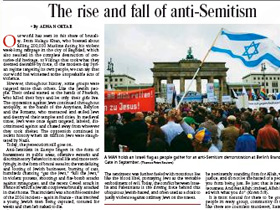
Our world has seen its fair share of brutality.
From Hulagu Khan, who boasted about killing 200,000 Muslims during his violent week-long rampage in the city of Baghdad, which also resulted in the complete destruction of centuries- old heritage, to Vikings that took what they deemed desirable by force, to the modern-day Syrian regime targeting its own people, we can say that our world has witnessed some unspeakable acts of violence.
However, throughout history, some groups were targeted more than others. Like the Jewish people.
Their ordeal started at the hands of Pharaoh, who killed their boys and let only their girls live.
The oppression against Jews continued throughout antiquity, at the hands of the Assyrians, Babylon and the Romans, who massacred and exiled Jews and destroyed their temples and cities. In medieval times, Jews were once again targeted, labeled, discriminated against and chased away from wherever they took shelter. The oppression continued in recent history when six million Jews were slaughtered by Nazis.
Today, the persecution still goes on.
Anti-Semitism in Europe lingers in the form of harassment in public areas, offensive remarks and discriminatory behavior in social life and more terrifyingly, in the form of brutal assaults; the vandalizing and looting of Jewish businesses, burning of cars, hundreds chanting “gas the Jews,” “kill the Jews,” in violent protests, shootings and fire-bomb attacks against synagogues, and the recent Creteil attack in France in which a Jewish couple was brutally attacked in their home. That incident was a horrible reminder of the 2006 incident – again in France – that involved a young Jewish man being captured, tortured for weeks and then left naked to die.
France is not the only place that witnesses anti-Semitism. From Argentina to Tunisia, from Ireland to Spain, Jews seem to be caught up in a constant cycle of hatred targeting their communities.
Even in the US, which is known for its unwavering support for Israel, Jewish people are wary of divulging their identities, or practicing their religious duties in public. An unprovoked attack on a 24-yearold Jewish man wearing a kippa by four men in Brooklyn, New York; the assault of a 12-year-old Jewish girl, who had a bottle thrown at her by a group of girls, including one who yelled, “You dirty Jew”; and the attack on a Jewish man in Los Angeles, California, who was surrounded by five male suspects who yelled “Heil Hitler!” before striking him, can be listed among the disturbing recent incidents in the US.
The Middle East is home to the worst cases of anti-Semitism, however. Especially after the recent Gaza war, hatred toward Jewish people regardless of age, gender or involvement in the conflict has risen in a disturbingly fast manner.
But why do some people seem to think that it is legitimate to hate Jews? In the past, some people saw Jews as underhanded conspirators who segregated themselves from the societies they lived in due to widespread anti-Semitic propaganda, such as The Protocols of the Elders of Zion.
The sentiment was further fueled with notorious lies like the blood libel, portraying Jews as the veritable embodiment of evil. Today, the conflict between Israelis and Palestinians is often used as a cloak to justify violence against ordinary Jews on the streets.
Surely political administrations or individuals within a community might make mistakes. However, persecuting a whole community based on the acts of few would be neither Koranic nor moral. The Jewish people are known for their calm and modest demeanor. They are a quiet people that like to occupy themselves with their daily routine and religious practices. Therefore it is even more surprising that such calm and reserved people have been on the receiving end of such persecution throughout the history.
Any resentment toward the policies of Israel should be voiced in a civil manner, without putting the blame on the entire community. God prohibits Muslims from such a behavior. In the Koran, God warns believers as such: “O you who have believed, be persistently standing firm for Allah, witnesses in justice, and do not let the hatred of a people prevent you from being just. Be just; that is nearer to righteousness.
And fear Allah ; indeed, Allah is Acquainted with what you do” (Koran 5:8).
It is most natural for there to be good and bad people in every group, community or nation. Just like there are countless murderers, liars and criminals in Muslim communities, it is natural for Jewish communities to include people whose actions are less than commendable. Yet, it is most absurd and ridiculous to feel antipathy toward a group in its entirety for the actions of a few. Most importantly, it is opposite to the teachings of Koran.
According to the Koran, Jews are People of the Book and are to be respected, protected and approached with love. God allows Muslims to bond with them through marriage, which alone explains the extent of friendship and closeness God expects from us to have with them. God also allows us to have social bonds with Jews, to have dinners with them in their homes.
God never tells Muslims to hate them, or discriminate against Jews or Christians. God praises Jews in many verses for their devotion and piety and indeed, Jewish people set a great example to Muslims with their unwavering loyalty to the prophet Moses.
All these facts make it clear that there is no basis, either in Islam or in Judaism, that could lead to such friction. Once everyone realizes that God created this world for love and it is against God’s wishes to harbor hostile feelings toward each other, brotherhood and peace will prevail.
Adnan Oktar's piece on Jerusalem Post:
http://www.jpost.com/Opinion/The-rise-and-fall-of-anti-Semitism-387325


